About Rohan Gunaratna
Rohan Gunaratna first visited Africa when he was 16 years old. Every summer over three years, he explored the Sahara. As an adult, he visited Libya, Algeria, Egypt, Morocco, Nigeria, Ethiopia, Somaliland, Ghana, and Kenya together with colleagues. As the founder head of the International Centre for Political Violence and Terrorism Research in Singapore from 2004-2018, he kept going back to Africa to help governments to build their capacities.
He conducted extensive research in Africa from visiting attack sites in Kenya to debriefing terrorists and interviewing leaders including Saif al Islam. He visited Abu Salim prison to interview the rank and file of the Libyan Islamic Fighters Group in 2010. To develop a rehabilitation program to transform mainstream extremists into productive citizens, he interviewed members of the Al Shabab and conducted a five-day rehabilitation training course in Mombasa for counter terrorism practitioners, clerics, teachers, vocational instructors, social workers, artists, and others.
With contributions from 25 continental experts, Prof. Gunaratna and Dr. C. Nna-Emeka Okereke edited “The Palgrave Handbook of Terrorism in Africa”, an exploration of Africa’s rise as a global terrorism epicenter.

About the Book
This book offers a comprehensive exploration of Africa’s emergence as an epicentre for global terrorism, delving into the critical factors shaping security threats and vulnerabilities across the continent. With a rich historical and empirical foundation, the book presents a nuanced understanding of the complex dynamics of terrorism, serving as a pivotal resource for effective counterterrorism and peacebuilding initiatives.
A distinguishing feature of this book lies in its meticulous country-specific and regional analysis of terrorism, unravelling the intricate interplay of internal and external forces that contribute to the genesis and perpetuation of terrorist activities in Africa. By examining the evolution of terrorism over the past three decades, the book sheds light on key milestones such as the adoption of the Organisation of African Unity’s Convention on the Prevention and Combating of Terrorism in Africa, the aftermath of the September 11, 2001, attacks, the ramifications of the Arab Spring, and the impact of the rise of the Islamic State on the African continent.
Contributed by experts from various African countries, the book provides a comprehensive overview of the nature, dynamics, and persistent challenges posed by terrorism. It underscores the intricate linkages at the national, regional, and international levels that fuel and sustain terrorism, offering crucial insights for policymakers and scholars alike. With its in-depth analysis and diverse perspectives, this book stands as an important resource for comprehending and addressing the multifaceted dimensions of terrorism in Africa.
The Palgrave Handbook of Terrorism in Africa is part of the book series titled ‘Palgrave Studies in Global Security’ (PSGS) published by Palgrave Macmillan:
- Offers a comprehensive exploration of Africa’s emergence as an epicentre for global terrorism by regional experts
- Unravels internal and external forces contributing to the genesis and perpetuation of security threats in Africa
- Serves as an important resource for effective counterterrorism and peacebuilding initiatives in Africa and beyond
Praise for the Book
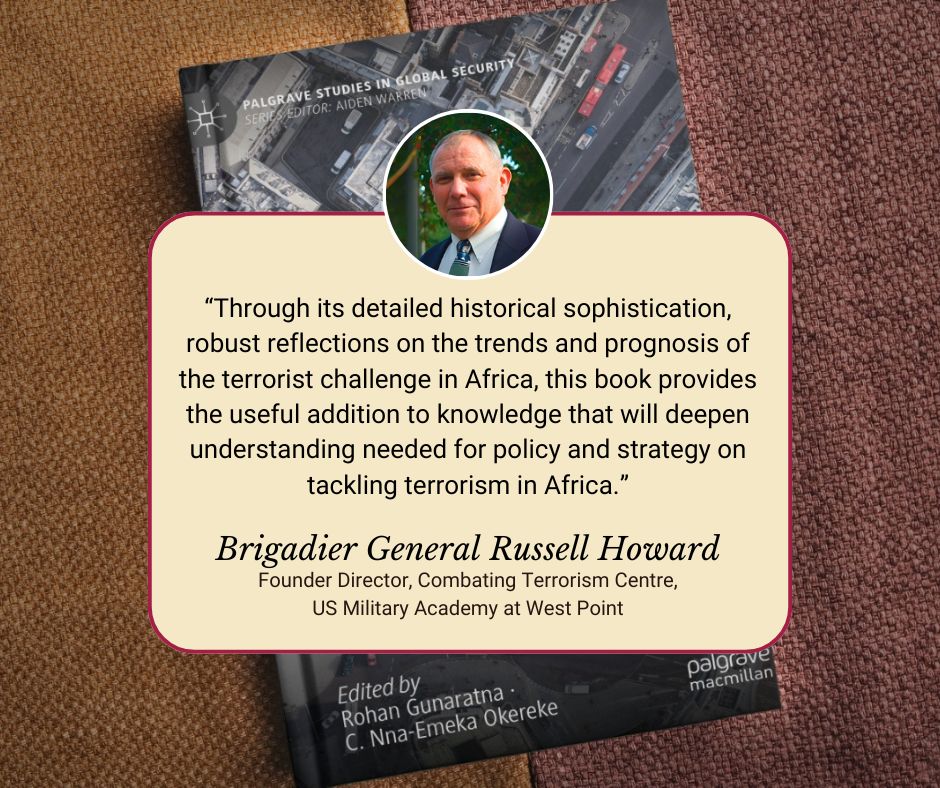
The Foreword on the ‘Palgrave Handbook of Terrorism in Africa’ is meticulously written by Brigadier General Russell Howard (Rtd). Founder Director, Combating Terrorism Center, United States Military Academy at West Point. I have had the distinct honor and pleasure of working with General Howard in the US and overseas. We were cochairs of the NATO Partnership for Peace Consortium’s Combating Terrorism Working Group (CTWG).
After the Combating Terrorism Center was established at West Point by General Howard with General Wayne Downing, he appointed Prof Bruce Hoffman and myself as the first Senior Fellows. My sincere thanks to General Howard for his steadfast commitment to upholding national security research and training.
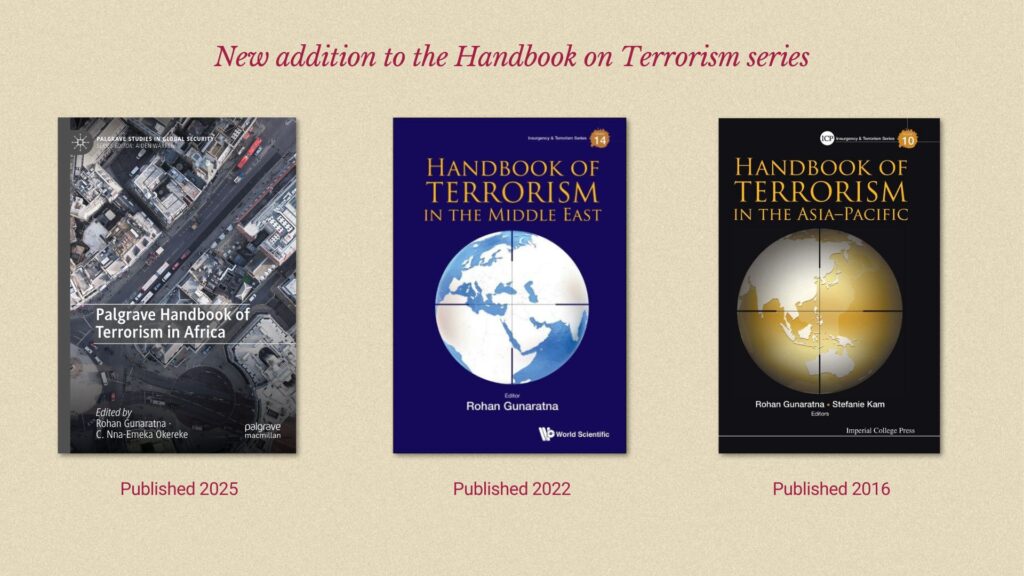
With the rise of global terrorism as a preeminent national security threat, I have taken the initiative and effort and authored a series of three handbooks on terrorism.
They are:
- Handbook of Terrorism in Africa together with Dr C. Nna-Emeka Okereke (Published by Palgrave Macmillan, 2025)
- Handbook of Terrorism in the Middle East (Published by World Scientific Publishing, 2022)
- Handbook of Terrorism in the Asia-Pacific with Stefanie Kam (Published by World Scientific Publishing, 2016)
The latest book on Africa is timely due to the rise of terrorism in the continent. Conducted by Al Qaeda and the Islamic State and their affiliates, the book through its 25 contributors, urges the international community to support Africa’s fight, both against their fanatical ideologies and operational capabilities.
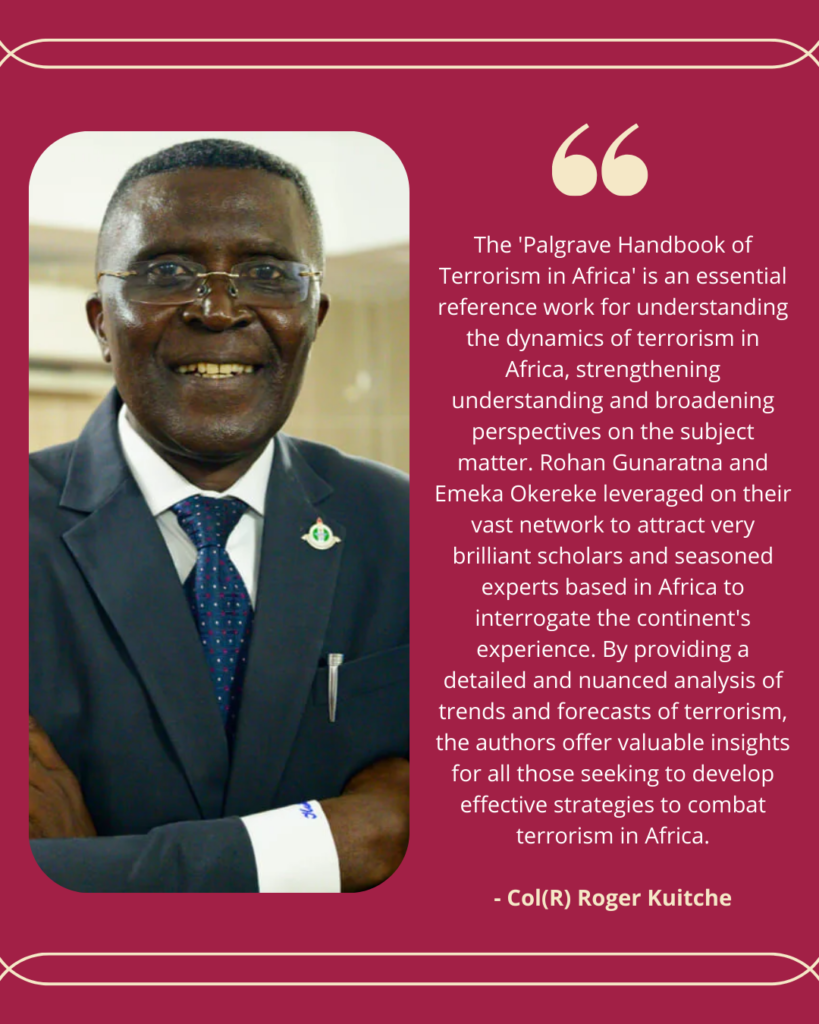
Col Roger Kuitche (rtd), Commander 41st Motorised Infantry Brigade (2014 – 2016) of Cameroon Military based in Kousseri, Far North Cameroon was tasked with the responsibility of combating the Boko Haram/ISWAP (2014 & 2016) after which he was posted to Abuja as Cameroon Defence Attache to Nigeria.
Colonel Kuitche has over 30 years of military experience and is now serving as a brilliant Defence Consultant and works with the AU Support Team in training troops of the Multinational Joint Task Force in the Lake Chad Basin alongside my co-editor of the ‘Handbook of Terrorism in Africa’ C. Nna-Emeka Okereke.
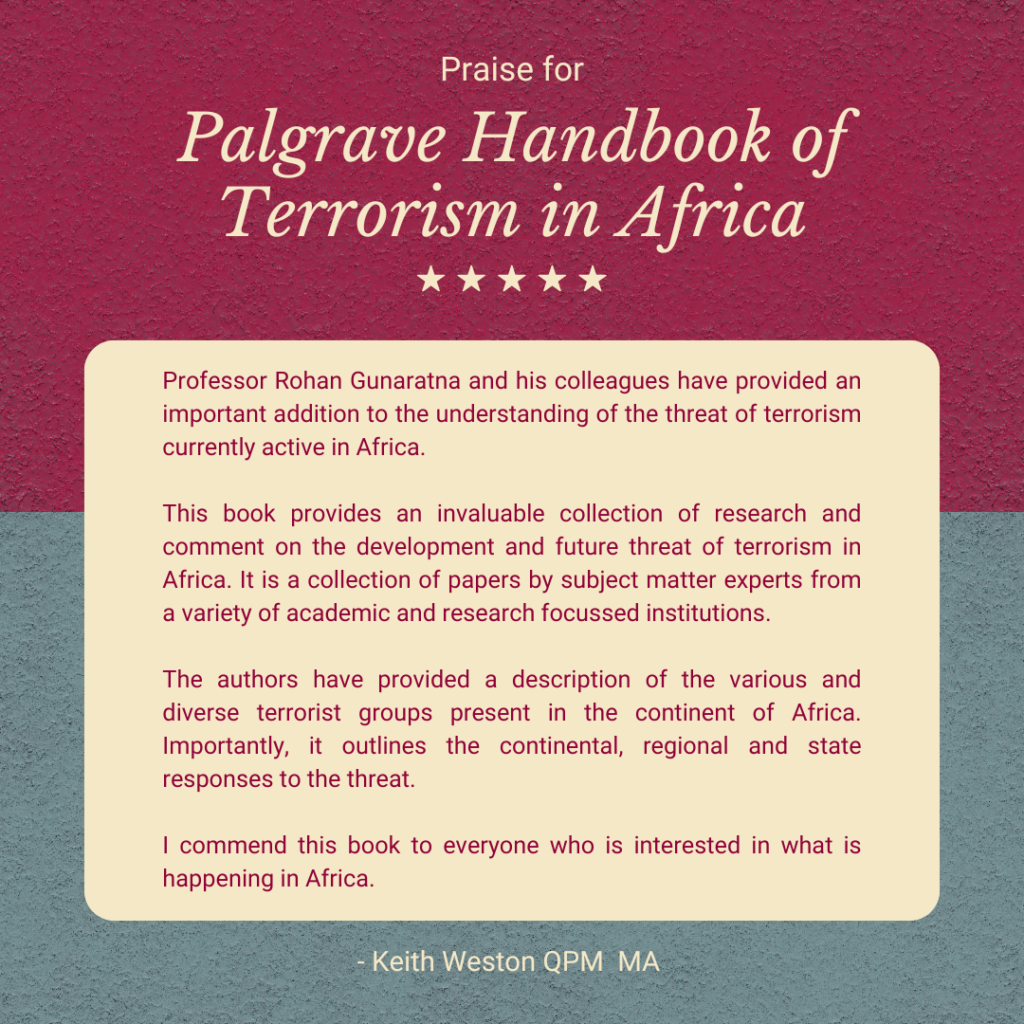
My thanks and respects to – Keith Weston QPM MA for his review of the Palgrave Handbook of Terrorism in Africa co-edited by Dr C. Nna-Emeka Okereke and myself, and published by Palgrave Macmillan! As former Detective Chief Superintendent, his service at the New Scotland Yard was invaluable!
—
More about Keith Weston QPM MA:
Keith served in the Metropolitan Police Service for thirty-two years. The majority of his service was in Special Branch and the Anti-Terrorist Branch. In 1992, Keith was awarded an MA in Police Studies, by Exeter University. In 2003, he was awarded the Queen’s Police Medal for his contribution to Counter Terrorism.
Keith’s last post in the police was the head of the Police International Counter Terrorism Unit, that was established following the devastating attacks on the USA on 11 September 2001. It was during this last period that Keith met with internationally renowned Academics, including Professor Rohan Gunaratna, and worked with them to gain a better understanding of the motivations and drivers of the individuals and organisations behind the emerging terrorist threats. This knowledge was translated into operational material to better equip counter-terrorist practitioners, who, at that time, had little or no knowledge of the new threats.
In 2005, Keith retired from the police service with the rank of Detective Chief Superintendent and joined Cranfield University as a Senior Research Fellow in Counter Terrorism, at the UK Defence Academy, where he was awarded a PGCLTAHE. In 2011, Keith took early retirement from Cranfield University and returned to government service until his retirement in 2021. In October 2021, Keith was appointed as a Visiting Fellow at the Cranfield Forensic Institute.

The review is available to view on Taylor & Francis Online. The first 50 viewers receive free access to the full review.
Click on the below link to access the free e-print: link
More about my colleague Joshua:
Joshua Snider currently serves an Associate Professor of International Security Studies at the UAE National Defense College in Abu Dhabi. His research focusses on non-traditional security and state responses to religious extremism and the governance of counter-radicalisation programmes in the MENA region and Southeast Asia. Over the last 15 years he has taught at various universities in Southeast Asia and Australia, including at the University of Nottingham’s Malaysia campus in Kuala Lumpur. Prior to the academy Joshua held positions with Canada’s Department of International Affairs and International Trade and in the public affairs consulting industry.

I am very grateful to my colleague Thomas Wuchte, the founder of the Center for Multilateral Leadership, Washington, DC., for reviewing the “Handbook of Terrorism in Africa”.
Tom knows Africa – he built capacity in the continent when he led an Intergovernmental Organization — the The International Institute for Justice and the Rule of Law (IIJ). Although at two different times, we were both at West Point and at the University of Illinois. A graduate of the United States Military Academy at West Point, he received a post-graduate degree from the University of Illinois. A recipient of the Department of State’s Highest Award for Excellence in International Security Affairs for his efforts to work collaboratively with international partners regarding the UN Security Council, Tom has served in multilateral diplomatic postings related to arms control, nonproliferation, terrorism, mediation negotiations, and regional confidence building measures.
The review is available to view on the Small War Journal website here.
Events
PeaceTalks with Prof Gunaratna: Africa – The emerging epicentre of Terrorism
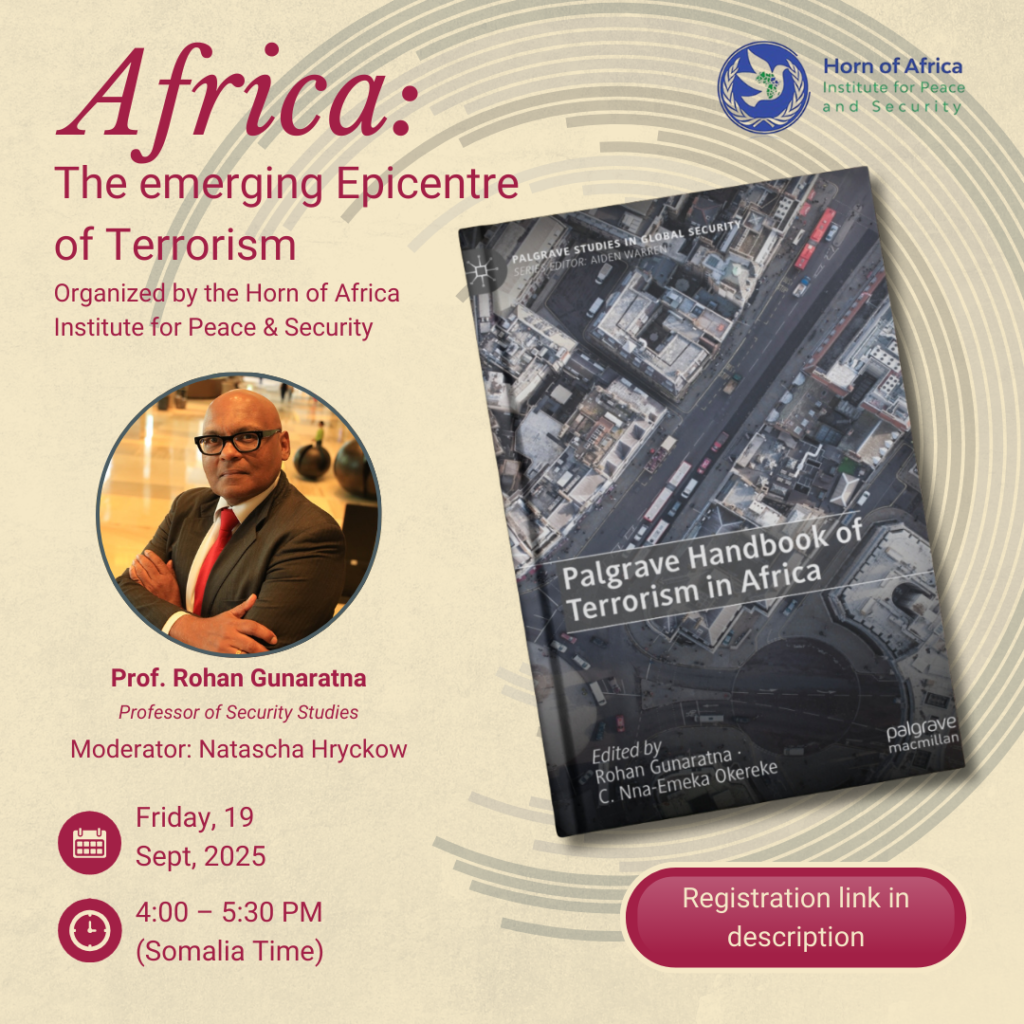
Inviting policymakers, researchers, practitioners, and peacebuilders to join the conversation.
Organized by Horn of Africa Institute for Peace and Security (HoAIPS), this PeaceTalks will feature Prof Rohan Gunaratna.
Topic: Africa: The Emerging Epicentre of Terrorism
Date: Friday, 19 September 2025
Time: 4:00 – 5:30 PM (Somalia Time)
🎤 Moderator: Natascha Hryckow
Africa is increasingly at the frontline of terrorism, affecting local communities, regional stability, and global security. In this session, Prof. Rohan Gunaratna a globally recognized expert on terrorism and security studies, will share insights on the drivers of violent extremism, emerging threats, and strategies for sustainable peace.
The full webinar can be watched here.
2-day Workshop on Counter Terrorism in Africa

Inviting African government & civil society leaders, policymakers, security practitioners, and students!
“Counter-Terrorism in Africa” is a 2-day workshop to be held this December 15-16, 2025.
Presented by Prof Rohan Gunaratna (Professor of Security Studies at RSIS, NTU in Singapore) and Prof C. Nna-Emeka Okereke (Fellow at Defence College, Nigeria), this workshop is organized by Horn of Africa Institute of Peace and Security (HoAIPS). .
Date: 15-16th (Mon-Tues) December 2025
Time: 6:00 PM – 8:00 PM (East Africa Time)
Moderated by Natascha Hryckow (Senior Strategic Advisor at HOAIPS), this virtual 2-day workshop will provide a comprehensive analysis of terrorism threats in Africa and explore effective response strategies. The presenters are editors of the recently published Palgrave Handbook of Terrorism in Africa, which examines Africa’s emergence as a global terrorism epicenter and explores internal and external forces shaping regional security threats.
Registration link: https://us06web.zoom.us/meeting/register/Y0Uw3OfyQqGWm8AX4MGhnA
This workshop will help participants to:
- Examine the evolving terrorism landscape in Africa and its global implications.
- Analyze regional insurgencies, particularly in the Sahel and Lake Chad Basin.
- Explore state and community-level strategies for preventing and mitigating terrorism.
- Facilitate knowledge exchange between African and international counter-terrorism experts.
- Strengthen collaboration for research, policy, and operational interventions in regional security.
The full recording of the 2-day workshop can be accessed here: